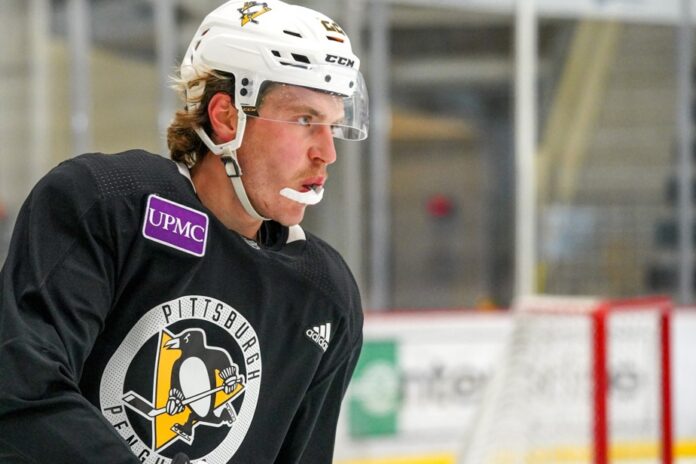(Buffalo) Training camp is the time of year when almost everyone is aiming for the NHL. This is especially true for high draft picks, those who have been accustomed to starting each stage of their career faster than others.
Since 2019, Samuel Poulin has been one of these 1st round picks. He even played his first three games in the NHL last year, with the Penguins. His goal at camp this year?
His statement contrasts with what we hear everywhere in September. But to understand it, you have to know that the young man has come a long way.
Last December, the Penguins revealed that Poulin was putting hockey on hold. “Personal reasons,” the team wrote. In March, the striker himself announced his return and confirmed that he had taken time to treat his mental health.
Moreover, very few details have leaked out, and the young man was not yet ready to discuss it publicly, in the media. During a visit to the Penguins farm club in Laval last April, interview requests were refused. Then, Friday evening, after his first game at the rookie tournament in Buffalo, he spoke with five journalists from Montreal to deliver his message.
Despite his initial warning to “not talk too much about it,” he opened up for about ten minutes. We didn’t ask him directly, but we can guess that it’s partly to help other young people – hockey players or not – who feel the need to take a break.
“It’s day and night,” he says. I learned to know myself, I listen to my body more than before. I’m glad I took this time off. At first, I didn’t see it like that, but looking back, I see that it bore fruit and I came out of it grown. »
Poulin makes no secret of it: the pleasure of playing was no longer there. “I’m really staying on the surface, I don’t want to go into detail, but I arrived at the arena and I was…” he begins, dropping the sentence.
“When I started playing at 4-5 years old, I just had a smile on my face every day I had a stick in my hands. But over the years, I had lost that a little. »
It was the kind of sign that made him understand that he needed to take some time off. A break during which he was able to educate his family about issues that weren’t really part of the conversations when his father, Patrick, played in the NHL.
Raising awareness was “with my mother too!” They just wanted me to be okay. But it’s not like a knee injury, where you do a scan, it’s torn, you know what it is. It’s harder to visualize, to understand. Sometimes I had to explain it to them in different ways. Eventually, it made sense in their heads. They too have grown tremendously in this process and it has just helped the whole family.”
Poulin has only good words for Kyle Dubas, the team’s new GM, who took office this summer, as well as for the old administration, headed by Ron Hextall and ousted during the off-season. Dubas and Jason Spezza told him that colleagues at the Maple Leafs had experienced their own mental health issues.
Poulin is now trying to make up for lost time on the ice, as he has only played “two games in the last nine months.” Friday, he faced the prospects of the Bruins. Late in the game, with Boston up 4-2, the Penguins pulled the goalie and called a timeout. Poulin was entitled to a presence of almost two minutes, the pedal to the bottom.
“If you watch him go to practice, you would have no idea he missed so many games,” warned Penguins head coach J.D. Forrest after the game. He’s a competitor who does a lot of good things. I have no worries for him.
“It’s always good to see someone overcome obstacles. Even aside from what he has experienced, he is an inspiration to his teammates with his way of playing and his dedication to his sport. Just with that, you can see that he will become a leader. »
Until then, Poulin knows very well that he will still have ups and downs, and that is precisely what he wants to tackle.
“It’s about learning from bad days so you don’t go through the same pitfalls. You too have bad days, he tells RDS colleague Éric Leblanc. We all have them. It’s just learning from that. Often, people try to repress their tougher emotions as much as possible. That’s not how it’s going to get better. It’s only by heading towards the problem that we come out stronger. »















